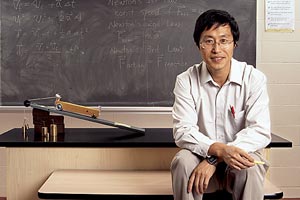
The Courage to Teach in Afghanistan
Though schools are open, death threats persist.
by Sally Armstrong
Transition to Teaching 2006: The best and worst of times
by Frank McIntyre and Brian Jamieson
Transition to Teaching 2006: Help for new teachers slow in coming
by Frank McIntyre and Brian Jamieson
Living the Standards
by Lois Browne
Vimy Revisited
Port Perry teacher Dave Robinson co-ordinates teachers and more than 3,600 students on this trip to the historic ridge.
by Leanne Miller
Transition to Teaching 2006
The best and worst of timesAccording to the College's fifth year Transition to Teaching study, these are the best and the worst of times to find a job in teaching.by Frank McIntyre and Brian Jamieson |
Depending on whom you know – perhaps even more than your skill set – the job market for newly certified teachers can be a smooth, straight slide into full-time employment or a circuitous path laden with bureaucratic bramble and years of frustration.
According to survey results there are three possibilities facing newly certified teachers:
- One, it's smooth sailing for graduates of French-language programs.
- Two, teachers qualified to teach Junior Kindergarten to Grade 6 can expect to wait years to find full-time work.
- Three, the employment situation for internationally educated teachers (IETs) is dismal – raising serious questions about the disconnect between certification and the hiring practices of Ontario school boards.
For the third year running, half of those who answered our survey had not found regular teaching jobs by the end of their first year in the profession – despite increased hiring to meet government expectations for smaller classes and literacy and numeracy initiatives.
New teachers are, however, resilient. Fully 92 per cent say they plan to teach in Ontario next year. Only three of almost 1,300 survey respondents say they will leave teaching altogether.
 |
Anthony Zhou, one of the graduates with high-demand qualifications, teaches Grades 11 and 12 physics and Grade 10 science at Westmount Collegiate Institute in Thornhill. |
Their commitment is consistent with feedback from the College's 2006 State of the Teaching Profession member survey, in which 81 per cent of respondents said they would recommend teaching as a career – up from 67 per cent in 2003. But those who follow that advice could wait years to find a steady job.
Among its revelations the Transition to Teaching study found that:
- Only 25 per cent of non-French, Primary-Junior teachers outside the Greater Toronto Area (GTA) have found full-time jobs by the end of their first year.
- Thirty-five per cent of all newly certified teachers work as daily occasional teachers.
- Twenty-nine per cent have long-term occasional positions and only 36 per cent started in regular positions.
- Twenty-one per cent work in two or more schools.
- In contrast to those numbers:
- Seventy-one per cent of teachers qualified to teach in French found regular jobs by spring in their first year.
- Sixty-four per cent of teachers qualified to teach secondary physics, math or tech studies secured regular jobs.
- Sixty-six per cent of teachers who work outside the GTA and have these high-demand qualifications found regular employment.
Late hiring, fragmented teaching schedules, difficult assignments and little support persist for most new teachers, the study shows.
Fifty-nine per cent of those who landed a regular teaching job in their first year were hired after school began – 19 per cent in September and 40 per cent later in the year.
 |
Teresa Trentadue teaches Grade 6 math, language, science, history and geography, and dance to Grades 4 through 7 at Baythorn Public School in Thornhill. |
French teachers remain the strong exception to job-search difficulties. Graduates from French-language programs and those able to teach French as a Second Language have their pick of jobs.
Finding a job was “very easy,” said one respondent. “I am a French teacher. I had many principals calling me and offering me positions.”
To a lesser degree the market also favours those who can teach math, physics, chemistry and technological studies.
“With 150 applicants on average per position, will they even see my resumé?”
“I applied for any job I was qualified for – 76 in total – and only received one phone call for an interview,” said one new teacher. “Now that I have worked on the occasional list for one year I am still applying at the same level. With 150 applicants on average per position, will they even see my resumé this time?”
Another said: “It's very difficult and comes down to who you know. Too much misinformation exists between the board, principals and individual schools. The system isn't just.”
Finding that first job remains an uphill battle for most newly certified teachers. Many find the process biased and uneven. Some express bitterness.
“Hiring is based on personal connections as hundreds are applying for one job,” one new teacher said.
“Too many retired teachers occupy vital spaces on my school board's limited-number supply list,” said another.
Among newly certified teachers educated outside Ontario, three different groups were identified – immigrant teachers who were educated outside Canada, Ontarians educated in other countries or provinces and Canadian teachers from other provinces – and three distinctly different transition experiences are evident in their responses.
The latter two groups had similar experiences to those educated at Ontario faculties. New Canadians, however, found the job hunt daunting.
 |
Jacey Donaldson, with Primary/Junior qualifications, has found a long-term occasional position teaching a Grade 2/3 split at St. Joseph Catholic School in Gananoque. |
“The [hiring] process was the most humiliating and degrading thing I have gone through in my life,” said one IET.
“I'm still volunteering in a public school,” said another, “but without references no board even calls me for an interview. No one wants to see my potential.”
At the time of the survey four out of 10 immigrant teachers had never been hired even as occasional teachers, compared to one out of 10 teachers educated in Ontario or Canada.
Most (69 per cent) new-Canadian teachers who are hired are limited to daily occasional teaching. They are also more apt to teach part-time (48 per cent) and teach in two or more schools (61 per cent) after they're certified.
“No Canadian experience equals no job.”
High-demand qualifications don't seem to help. New Canadian teachers who are qualified to teach math, physics and chemistry still aren't hired. They face difficulties in landing a job similar to those faced by Canadians without those qualifications.
The message to outsiders is clear: unless you have a Canadian BEd, local experience and contacts, you're out of luck. “It's a closed circle,” one new teacher wrote. “No Canadian experience equals no job.”
Private or independent schools offer IETs some hope. One in seven report finding work outside the public system. GTA boards also employed 66 per cent of the qualified IETs who managed to find work in Ontario.
“There is an undeniable preference for non-immigrant teachers over immigrated ones,” lamented one immigrant teacher.
Geography is a major factor in teacher employment, overall.
 |
Harjit Pooni, who received his BEd in India, now volunteers at Chinguacousy Secondary School in Brampton to gain a foothold and “Canadian experience.” |
The GTA absorbs many new grads. Even those who lack qualifications in the high-need subject areas – math, science, technical studies – say they succeeded in finding regular first-year work.
Outside the GTA most first-year teachers work in occasional roles and are twice as likely to feel that they didn't work as much as they'd hoped to in their career-entry year (Chart 2).
One in four of all new teachers said they did not work as much as they wanted to in their first year in the profession (Chart 1). Many accept occasional teaching as the route to permanent employment.
Most newly certified teachers in central, eastern and southwestern Ontario could not find regular teaching jobs in their first year. Teachers in the north fared marginally better.
Qualifications in the high-demand subjects trump regional differences when it comes to hiring trends and, except for internationally educated teachers, full-time work is available across Ontario for those who meet pressing needs.
Methodology: The College mailed surveys in May 2006 to members of the College who graduated in 2005 from teacher education programs: 40 per cent of the 8,223 Ontario faculty of education graduates and 40 per cent of the 1,203 graduates from teacher education programs at six US border colleges who became members of the College in 2005. Overall, we received 1,289 responses for a 32 per cent return rate. The survey results are considered accurate within 2.7 percentage points, 19 times out of 20. A Ministry of Education grant helps to fund the study.
The College also mailed surveys to all 2,232 teachers educated outside Ontario who were certified in 2005. These included immigrant teachers, Ontarians educated in other countries and provinces as well as Canadians migrating to Ontario from other provinces. Twenty-four per cent of this group responded, for an accuracy rate within 4.1 percentage points, 19 times out of 20.
Chart 1 – Percentage of first-year employed teachers in regular teaching jobs by end of first year of teaching – 2006
| Qualifications | Greater Toronto area | Ontario outside GTA | Central Ontario | Eastern Ontario | Southwest Ontario | Northern Ontario | Total Ontario |
| French language | 86 | 65 | 73 | 60 | 75 | 64 | 71 |
| High demand JI, IS and tech qualifications | 61 | 66 | 75 | 61 | 64 | 75 | 64 |
| Others – PJ | 52 | 24 | 18 | 27 | 24 | 23 | 36 |
| Others – JI | 64 | 31 | 36 | 17 | 31 | 40 | 42 |
| Others – IS | 69 | 42 | 46 | 32 | 42 | 54 | 56 |
| All qualifications | 63 | 42 | 39 | 43 | 39 | 51 | 51 |
Chart 2 – Percentage of reported underemployment in first year of teaching – 2006
| Qualifications | Greater Toronto area | Ontario outside GTA | Central Ontario | Eastern Ontario | Southwest Ontario | Northern Ontario | Total Ontario |
| French language | 5 | 17 | 20 | 25 | 3 | 11 | 13 |
| High demand JI, IS and tech qualifications | 15 | 17 | 17 | 22 | 9 | 13 | 14 |
| Others – PJ | 23 | 39 | 24 | 46 | 39 | 41 | 32 |
| Others – JI | 14 | 44 | 55 | 25 | 45 | 47 | 34 |
| Others – IS | 12 | 34 | 27 | 26 | 36 | 46 | 22 |
| All qualifications | 15 | 31 | 30 | 32 | 32 | 28 | 24 |
American-program grads struggling to find work
Ontario residents can wait years for their investments in American teacher education to pay off.
Graduates from US teacher education programs – many who pay in excess of US$20,000 to learn how to teach – say they can't find work in Ontario once they graduate.
One of three grads from teacher education programs at US border colleges found full-time work in Ontario last year. Half of Ontario's grads, by comparison, landed regular jobs.
For the most part the US-based programs don't meet Ontario's high-need demands. Nor do they teach French. More than 70 per cent of the American graduates surveyed hold Primary-Junior basic qualifications. None of those at the Intermediate-Senior level specialize in tech studies. And few hold qualifications in math, physics or chemistry.
Ontario currently boasts a glut of teachers qualified to teach at the elementary level. Declining retirement rates are partly responsible.





